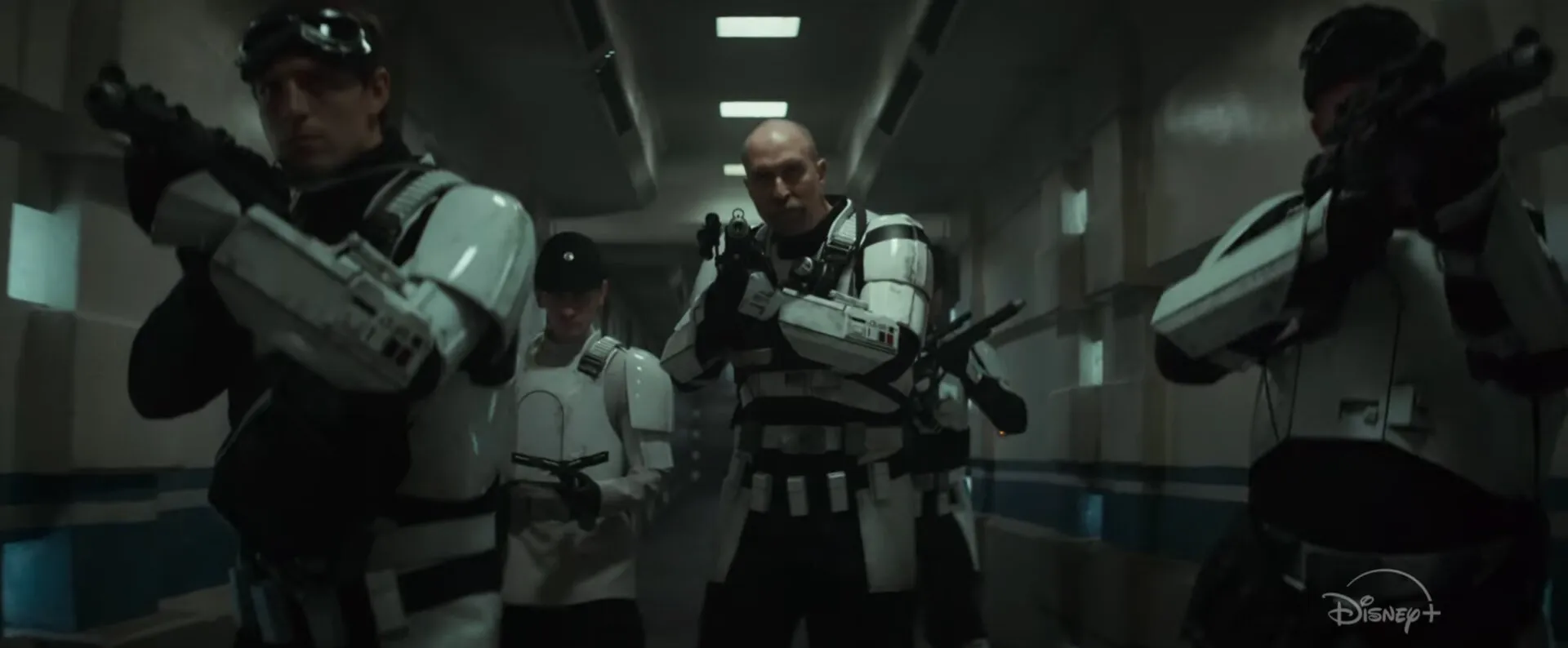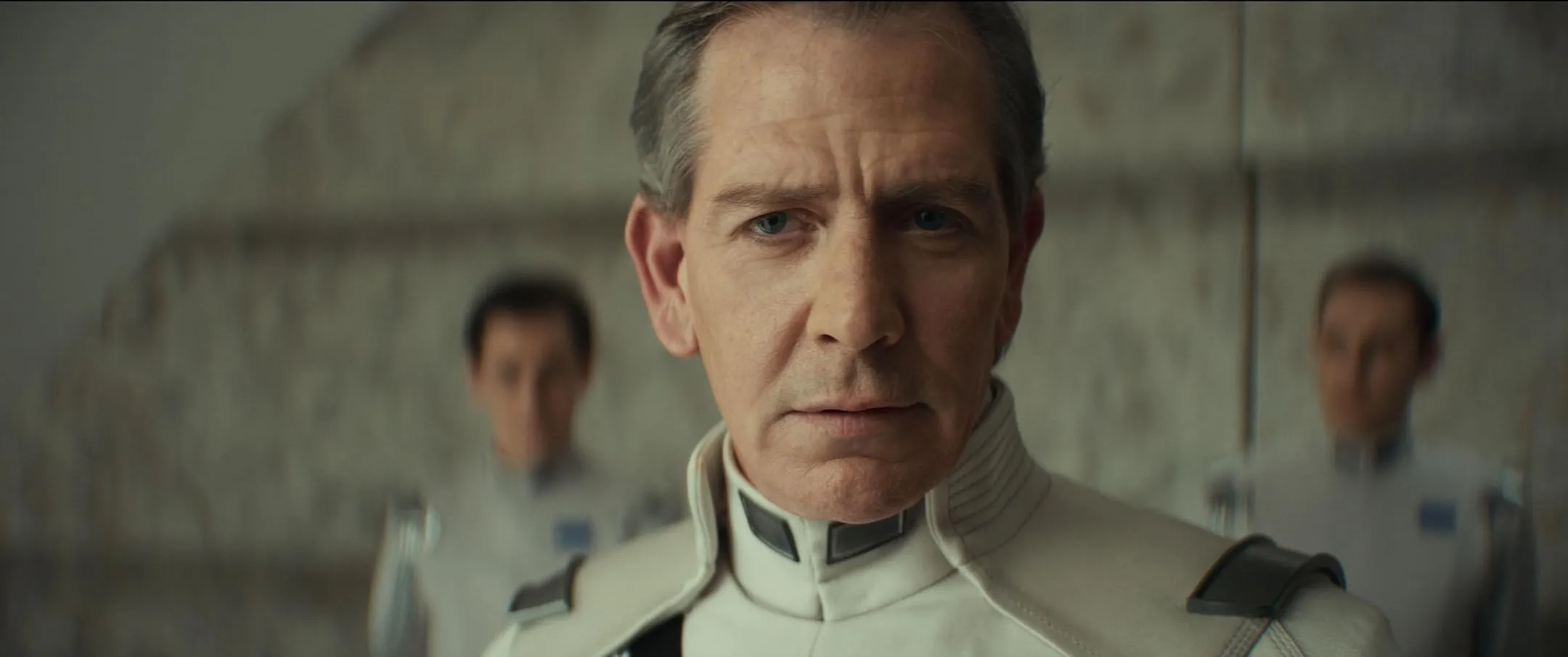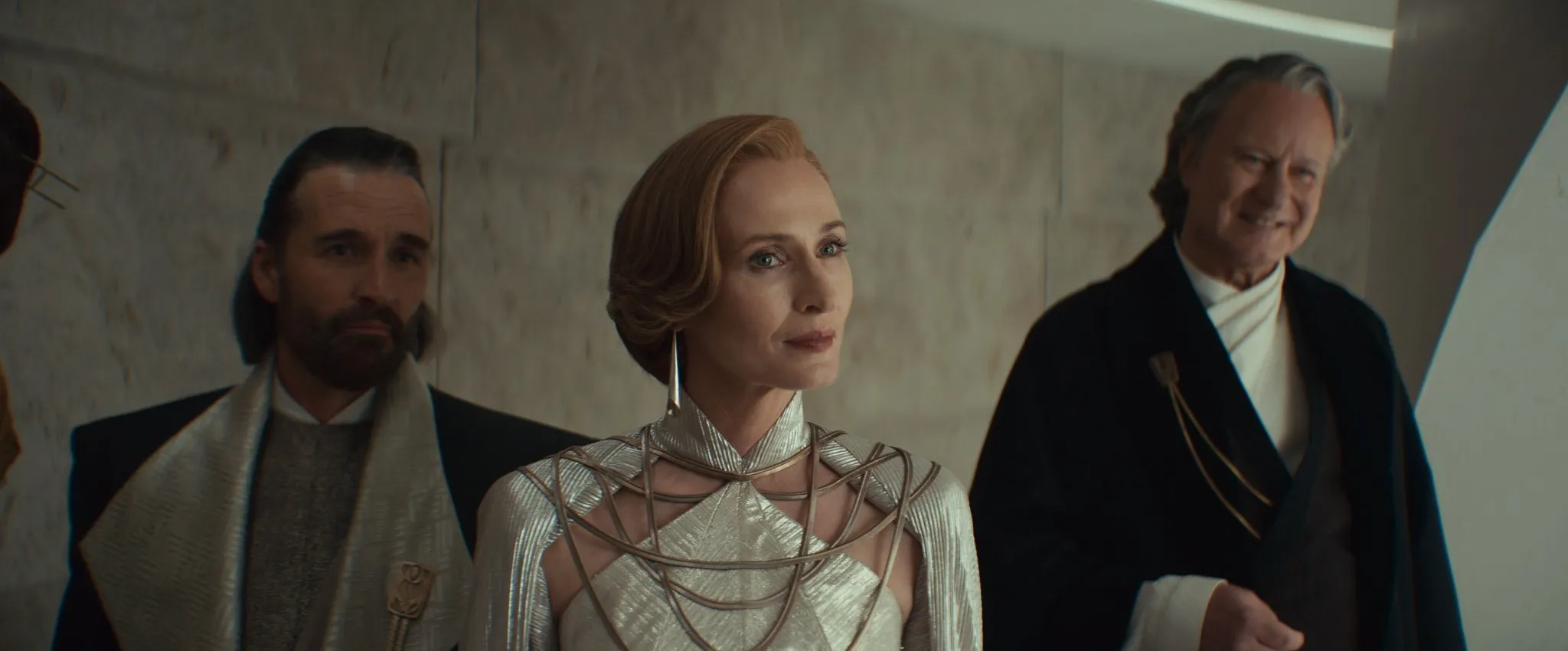Andor Season 2 thrusts viewers into an insurgency that feels eerily familiar, echoing the fragmented revolts unfolding around the world. The series’ four‑arc structure, each separated by a year in‑story, charts the evolution of grassroots defiance—from whispered talks in a Coruscant back room to the thunder of crowds on Ghorman’s stone streets.
Diego Luna’s Cassian Andor remains haunted by both his failures and his ideals; his dual existence as Imperial officer and undercover rebel mirrors the moral compromises exacted by real‑world surveillance states. Meanwhile, Adria Arjona’s Bix navigates a healing journey scarred by torture—a storyline that spotlights trauma survivors rarely centered in space operas.
On Coruscant, Genevieve O’Reilly’s Mon Mothma quietly subverts patriarchal norms within the Senate, her coded appeals for truth to an indifferent majority speaking volumes about modern debates over free speech and media manipulation. Andor’s pacing—breathing room between tense missions, followed by bursts of coordinated action—breaks from standard binge‑bait formulas, inviting reflection rather than immediate gratification.
By weaving intimate character studies into a sprawling political thriller, the season carves out space for representation of both visible and hidden struggles, signaling a new direction for streaming dramas that seek to engage rather than simply entertain.
A Four‑Act Rebellion: Structure and Momentum
Andor Season 2 organizes its twelve episodes into four self‑contained arcs, each spanning three installments and separated by a one‑year leap. This design reframes expectations about pacing on streaming platforms: instead of binge‑friendly drops, viewers receive narrative capsules that demand active engagement.
Arc 1 launches with Cassian’s ill‑fated TIE Avenger theft, upending the usual sci‑fi comfort of pilots who know their ships. His trial‑and‑error struggle to master the vessel hints at the season’s spy‑thriller leanings, where even technology falters under imperial scrutiny. In this “side‑quest,” Cassian’s fumbling serves double duty—it introduces espionage tropes while reminding us that insurgents often learn on the job, against a backdrop of distant starfields and suspicious allies.
Arc 2 shifts to Ghorman, where an invented dialect and local customs signal a fresh cultural landscape. Here, the camera splits between rebel agitators forging bonds in shadowed alleyways and Imperial officers planning a heavy‑handed crackdown. The contrast exposes the human cost of colonial resource grabs: linen‑making artisans become symbols of resistance. Every protest chant, every coded broadcast underscores how insurgency blossoms when voices are muted by propaganda.
Arc 3 returns us to Coruscant’s gilded halls, following Mon Mothma’s clandestine fundraising beneath the polite veneer of a senator’s daughter’s wedding. The formal gowns and imported delicacies feel almost absurd, given the season’s mounting casualties, yet they reveal how revolutions require both glittering diplomacy and secret bank transfers. This tension between public ceremony and private defiance maps the logistical underpinnings of a movement that cannot survive on idealism alone.
Arc 4 draws all threads toward the familiar opening of Rogue One. Cameos—from K‑2SO’s dry quips to Melshi’s steady resolve—remind us that each minor role feeds into a larger reckoning. Cassian’s final data heist carries the weight of history, cementing the series’ position as both a character‑driven drama and a bridge to galactic events we thought we knew.
Time jumps serve a dual purpose: they risk jarring the audience, yet they reward those patient enough to track subtleties in costume changes and character posture. Moments skip ahead, but those ellipses feel earned, offering snapshots of growth rather than endless exposition.
Meanwhile, recurring motifs—propaganda bulletins, ticking clocks, whispered code words—anchor each leap, weaving a sense of urgency that pulses beneath set‑piece revolts and intimate dialogues. Mini‑cliffhangers at each arc’s end ensure weekly viewership stays alive, proving that serialized television can still thrill without sacrificing depth.
Faces of Rebellion: Depth and Dynamism in Andor’s Ensemble
Diego Luna grounds Season 2’s moral complexity in Cassian Andor, a man torn between the crisp straight lines of an Imperial uniform and the ragged insurgent life he cannot abandon. His uneasy shifts—from dutiful soldier to covert operative—mirror the compromises real‑world activists face when systems demand performative loyalty.
Luna’s quiet glances, charged with regret, underscore how the line between hero and criminal often depends on who’s writing the history books. Meanwhile, his fraught alliance with Bix crackles with urgency: the dream of escape becomes an unspoken contract, each promise weighted by the cost of rebellion.
Adria Arjona’s Bix Caleen embodies a survivor’s resilience. Her recurring nightmares, in which a pale‑faced torturer looms, dramatize a struggle seldom centered in space‑epics—post‑traumatic growth. When she’s not repairing rusted farm tools or offering kind words to Wilmon, her waking life carries the residual tremors of violence. In those quieter moments—fixing a broken droid arm or sharing a tentative smile—Andor reminds us that insurgency is as much about mending wounds as it is about toppling empires.
Stellan Skarsgård’s Luthen Rael coaches new recruits with all the subtle cruelty of a chessmaster and the guile of a confidence artist. His partnership with Elizabeth Dulau’s Kleya emits a bracing blend of affection and moral ambiguity: she’s both conspirator and caretaker, her formative backstory lending an emotional ballast to the rebel cell’s most ruthless plans. Dulau’s performance, in flashbacks and hushed confidences, brings a necessary humanity to tales of clandestine violence.
On the political front, Genevieve O’Reilly’s Mon Mothma wears senatorial poise like a shield, then strips it away for secret speeches that rattle the Senate’s gilded cage. Between arranged marriages and under‑the‑table donations, O’Reilly conveys the tension of a woman expected to recite platitudes on one stage while scripting insurrection on another.
The Empire’s faces of authority are equally telling. Ben Mendelsohn’s Orson Krennic wields sadism with bureaucratic precision—his cruelty punctuated by dry asides that reveal how fascism often hides behind cubicle walls. Denise Gough and Kyle Soller turn a seemingly innocuous dinner party into a dark comedy of power grabs, while Kathryn Hunter’s Eedy Karn reminds us that grand tyranny trickles down into every household.
Even minor figures leave their mark. Wilmon and Brasso’s banter offers levity amid crisis, and surprise returns from K‑2SO and Melshi feel earned rather than shoehorned. New resistance fighters and ISB agents—caught between orders and conscience—draw attention to how unseen individuals shape the arc of history. In weaving personal tribulations into a sprawling revolt, Andor holds up a mirror to our own times, where lives on the margins are the true engines of social change.
Echoes of Power: Andor’s Sociopolitical Tapestry
Imperial broadcasts churn out dire warnings that peaceful gatherings amount to terror; it feels ripped from the playbook of real‑world authoritarian regimes. Mass arrests, forced disappearances and cage‑like detention centers draw chilling parallels to historical crackdowns, reminding viewers that oppression thrives on fear and bureaucracy. Dedra Meero’s scheme to ignite an uprising on Ghorman—staged by the very agents sent to quell dissent—reads like a false‑flag operation born of cold calculus rather than conscience.
Wilmon’s tender romance clashes with deadlines for revolt, a reminder that love rarely waits for political liberation. Cassian’s unclaimed plea for discharge haunts him like an unanswered telegram; he weighs personal escape against the promise of collective freedom. Luthen’s refrain—“we lose to win”—echoes through each mission briefing, transforming small defeats into the bedrock of eventual triumph. The Ghorman Massacre itself, captured in jolting close‑ups of shattered banners and echoing gunfire, turns peaceful protest into full‑scale armed resistance.
Cassian’s talent for slipping between Imperial officer and rebel ghost underscores how identity can be performance under duress. Mon Mothma’s public orations mask clandestine ledger entries; she trades parliamentary grace for covert generosity, proving that the truest revolutions often begin off‑record. Deception becomes both weapon and burden, as secret keepers sacrifice personal bonds to safeguard greater truths.
Ghorman’s handwoven cloth and village forums conjure occupied France—textiles as symbols of cultural pride under siege. By weaving historical motifs of Resistance movements with fresh languages and rituals, the series speaks to colonial exploitation and its modern echoes. Syril and Dedra’s opulent dinner party unfolds like a distorted Versailles gala, absurdly grand against the backdrop of civilian misery.
Even among the Empire’s foot soldiers, moments of hesitation flicker. An ISB recruit flinches at his first interrogation order; a rebel cell debates placards or rifles with equal passion. These vignettes of doubt and division humanize both sides of the conflict, showing how systemic cruelty depends on individuals who can still choose otherwise. A single stamped document can unleash atrocity; Andor’s attention to paperwork and protocol reveals how genocide often slides into place behind desks and seals.
Behind the Scenes: Production & Visual Design
Tony Gilroy’s return from Rogue One brings a rare marriage of franchise familiarity and fresh narrative drive. His overseeing of all four arcs—with Beau Willimon and Tom Bissell each steering a three‑episode block—yields tonal shifts that feel deliberate rather than jarring. One chapter pulses with hushed intrigue; the next bursts into overt insurrection. That writer‑director continuity ensures every moral quandary and whispered code word lands with clarity, reminding us that serialized streaming dramas can sustain both scope and intimacy.
Cinematographer Dan Mindel frames Andor in two distinct palettes. On Ghorman’s vast practical city‑square set—built to feel weathered and lived‑in—natural light washes in through towering arches. Ferrix, by contrast, breathes authenticity: corrugated metal workshops lit by harsh noon suns, dust swirling around farm machinery.
Imperial facilities, shot with steely overhead fluorescents and severe angles, feel less like starships and more like cubicles of cruelty. Handheld cameras trail Cassian through cramped corridors, while remote lenses police protestors in wide‑angle tableaux—a visual shorthand for surveillance culture.
Production design doubles as social commentary. ISB offices channel the aesthetics of Cold War bureaucracy, complete with rank‑color bands that resemble corporate branding kits. Rebel hideouts repurpose Luthen’s antiquities shop into a nexus of quiet revolt, every chipped vase and rusted datapad hinting at lives off‑camera. Costume choices speak volumes: Mon Mothma’s couture gowns conceal her subversive ledger entries, whereas Cassian’s threadbare uniform underscores his expendability in an empire obsessed with appearances.
Special effects and stunts ground the spectacle. The TIE Avenger heist leans on miniature models and practical cockpit rigs, delivering jerky realism rarely seen in pure CGI flights. Riot scenes on Ghorman employ real crowds and controlled pyrotechnics, amplifying chaos without digital artifice. Each blast, each desperate sprint, serves narrative stakes rather than mere blockbuster dazzle—proof that even in a galaxy far, far away, tangible craftsmanship still matters.
Harmony of Rebellion: Music, Sound & Editing
Nicholas Britell opts out of familiar orchestral fanfares, favoring jagged percussion and restless strings that echo the anxiety of insurgency. Each time Bix’s motif appears, a trembling cello line underscores her inner turmoil; Luthen’s entrance is marked by a low, almost imperceptible drone that hints at secrets beneath his calm exterior.
Ambient creaks of factory machinery and the metallic clank of stormtrooper boots anchor scenes in a lived‑in universe. Then—silence. In moments of interrogation or the smoldering aftermath of a skirmish, the absence of sound speaks louder than any score.
Sound editors layer overlapping radio broadcasts, street chants and encrypted transmissions into a rich tapestry. Dialogue remains clear, even when revolutionary fervor engulfs the frame.
Editors weave multiple storylines through seamless cross‑cuts: a domestic conversation in Ferrix might dissolve into a riot on Ghorman, forging hidden links between personal stakes and mass revolt. Tension builds in fits and starts—an explosive scene punctuated by a quiet reflection—and reminds us that pacing can be as political as any manifesto.
Cadence & Cultural Momentum: Pacing, Structure & Release Strategy
Andor Season 2 adopts a three‑episode‑batch rollout, carving the season into digestible “mini‑runs” that turn streaming fatigue on its head. Each trio ends on a cliffhanger, encouraging discussion across social feeds and giving viewers time to marinate in the show’s political undercurrents—an unexpected antidote to the binge‑and‑forget cycle.
 The series leaps forward by a year between arcs, a bold gamble: some might find the skips jarring, but they mirror how real‑world movements evolve in fits and starts. Title cards and Britell’s thematic bridges smooth these transitions, transforming temporal gaps into narrative breathers rather than holes.
The series leaps forward by a year between arcs, a bold gamble: some might find the skips jarring, but they mirror how real‑world movements evolve in fits and starts. Title cards and Britell’s thematic bridges smooth these transitions, transforming temporal gaps into narrative breathers rather than holes.
Action set pieces—explosive fight in an Imperial facility, desperate dash through Ghorman streets—alternate with quieter farmstead moments, reminding us that revolutions hinge on both spectacle and the mundane labor of hope.
All the while, Andor hums with the knowledge of its destiny: viewers edge toward Rogue One’s opening crawl, yet surprises persist. Foreshadowing is woven through props, dialogue and costume details, keeping anticipation high without tossing the audience into spoiler territory.
Full Credits
Directors: Toby Haynes, Susanna White, Benjamin Caron
Writers: Tony Gilroy, Dan Gilroy, Beau Willimon, Tom Bissell, Stephen Schiff
Producers and Executive Producers: Tony Gilroy, Sanne Wohlenberg, Kathleen Kennedy, Michelle Rejwan, Diego Luna, Toby Haynes, Kate Hazell, David Meanti
Cast: Diego Luna (Cassian Andor), Kyle Soller (Syril Karn), Adria Arjona (Bix Caleen), Stellan Skarsgård (Luthen Rael), Fiona Shaw (Maarva Andor), Genevieve O’Reilly (Mon Mothma), Denise Gough (Dedra Meero), Faye Marsay (Vel Sartha), Varada Sethu (Cinta Kaz), Elizabeth Dulau (Kleya Marki), Andy Serkis (Kino Loy), Forest Whitaker (Saw Gerrera), Alan Tudyk (K-2SO), Ben Mendelsohn (Orson Krennic)
Directors of Photography (Cinematographers): Adriano Goldman, Frank Lamm, Damián García
Editors: John Gilroy, Tim Porter, Hazel Baillie, Dan Roberts, Frances Parker, Matthew Cannings, Simon Smith, Yan Miles
Composers: Nicholas Britell (Season 1), Brandon Roberts (Season 2)
The Review
Andor Season 2
Andor Season 2 delivers a powerful political drama that melds intimate character work with a sprawling rebellion narrative. Its unconventional structure and unflinching look at power dynamics lift it above typical franchise entries. With standout performances, precise design and a pulse on real‑world struggles, it redefines what streaming epics can achieve.
PROS
- Rich political subtext that echoes real‑world struggles
- Nuanced performances, especially by Luna and Arjona
- Bold narrative structure with time‑jumps and mini‑arcs
- Exceptional production design and practical effects
- Thoughtful pacing that balances spectacle with quiet character moments
CONS
- Year‑leap transitions can disrupt viewer immersion
- Deliberately slow build may frustrate action‑hungry audiences
- Sparse fan service might disappoint franchise die‑hards
- Heavy, unrelenting tone can feel emotionally taxing




















































